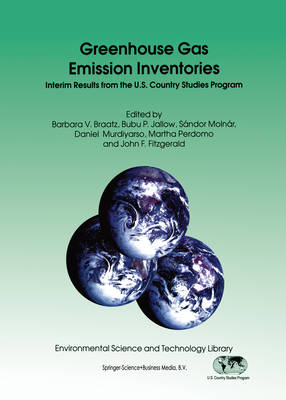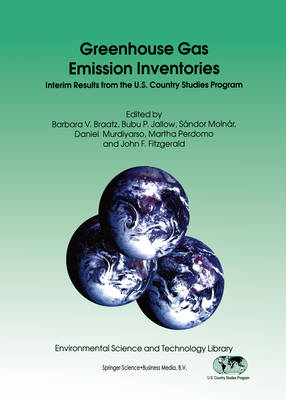
- Retrait gratuit dans votre magasin Club
- 7.000.000 titres dans notre catalogue
- Payer en toute sécurité
- Toujours un magasin près de chez vous
- Retrait gratuit dans votre magasin Club
- 7.000.0000 titres dans notre catalogue
- Payer en toute sécurité
- Toujours un magasin près de chez vous
Greenhouse Gas Emission Inventories
Interim Results from the U.S. Country Studies Program
251,45 €
+ 502 points
Description
International concern for the continued growth of greenhouse gas emissions, and the potentially damaging consequences of resultant global climate change, led to the signing of the United Nations Framework Convention on Climate Change by 155 nations at the Earth Summit in June 1992. The Convention came into force on 21 March 1994, three months after receiving its 50th ratification. All Parties to the Convention are required to compile, periodically update, and publish national inventories of anthropogenic greenhouse gas emissions and sinks using comparable methodologies. In support of this process, the US Country Studies Program (US CSP) is providing financial and technical assistance to 56 developing and transition countries for conducting national inventories.
This book presents the results of preliminary national inventories prepared by countries participating in the US CSP that are ready to share their interim findings. In some cases, inventories were prepared with support from other organizations. Preliminary inventories of twenty countries in Africa, Asia, Central and Eastern Europe and the Newly Independent States, and Latin America are presented, as well as regional and global syntheses of the national results. The regional and global syntheses also discuss results of eleven other preliminary national inventories that have been published elsewhere with the assistance of other programs. Results are discussed in the context of national and regional socioeconomic characteristics, and the regional and global syntheses compare national inventory estimates to other published estimates that are based largely on international databases. Papers also discuss inventory development issues, such as data collection and emission factor determination, and problems associated with applying the IPCC inventory methodologies.
The preliminary inventory results reported here represent significant progress towards meeting country commitmentsunder the Framework Convention, and provide useful information for refining international greenhouse gas emission databases and improving inventory methodologies. As the first book to compile national greenhouse gas emission estimates prepared by national experts in developing countries and countries with economies in transition, this will be an invaluable resource to scientists, policymakers, and development specialists in national, regional and global anthropogenic sources and sinks of greenhouse gases.
This book presents the results of preliminary national inventories prepared by countries participating in the US CSP that are ready to share their interim findings. In some cases, inventories were prepared with support from other organizations. Preliminary inventories of twenty countries in Africa, Asia, Central and Eastern Europe and the Newly Independent States, and Latin America are presented, as well as regional and global syntheses of the national results. The regional and global syntheses also discuss results of eleven other preliminary national inventories that have been published elsewhere with the assistance of other programs. Results are discussed in the context of national and regional socioeconomic characteristics, and the regional and global syntheses compare national inventory estimates to other published estimates that are based largely on international databases. Papers also discuss inventory development issues, such as data collection and emission factor determination, and problems associated with applying the IPCC inventory methodologies.
The preliminary inventory results reported here represent significant progress towards meeting country commitmentsunder the Framework Convention, and provide useful information for refining international greenhouse gas emission databases and improving inventory methodologies. As the first book to compile national greenhouse gas emission estimates prepared by national experts in developing countries and countries with economies in transition, this will be an invaluable resource to scientists, policymakers, and development specialists in national, regional and global anthropogenic sources and sinks of greenhouse gases.
Spécifications
Parties prenantes
- Editeur:
Contenu
- Nombre de pages :
- 389
- Langue:
- Anglais
- Collection :
- Tome:
- n° 9
Caractéristiques
- EAN:
- 9780792341420
- Date de parution :
- 30-06-96
- Format:
- Livre relié
- Format numérique:
- Genaaid
- Dimensions :
- 210 mm x 297 mm
- Poids :
- 1323 g

Les avis
Nous publions uniquement les avis qui respectent les conditions requises. Consultez nos conditions pour les avis.





